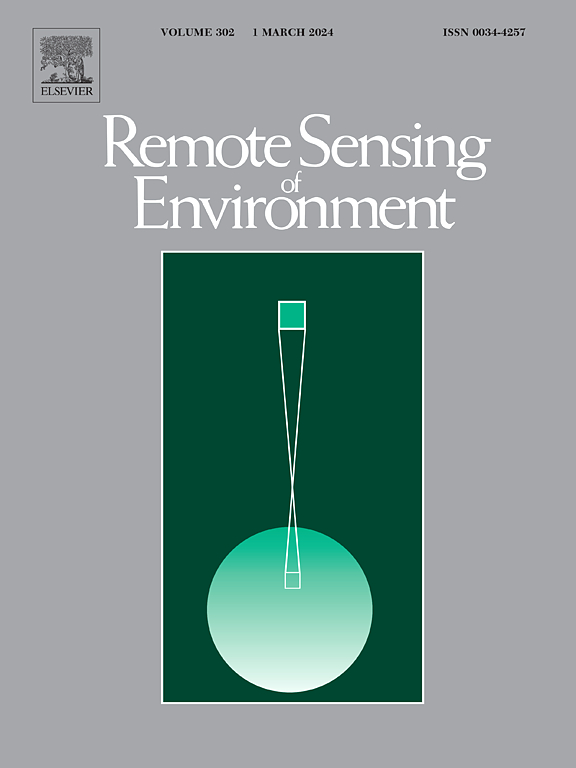从FY-4B/GIIRS中提取高精度日大气气体的最佳顺序物理检索系统:理论、算法和评价
IF 11.1
1区 地球科学
Q1 ENVIRONMENTAL SCIENCES
引用次数: 0
摘要
FY-4B卫星上的地球同步干涉红外测深仪(GIIRS)是世界上第一个也是目前唯一一个在地球同步轨道上运行的高光谱热红外测深仪,具有在白天和夜间每小时连续扫描东亚上空大气的独特优势。与已建成的近地轨道卫星探测仪相比,FY-4B/GIIRS二级大气产品的研制和应用仍处于探索阶段。在这项研究中,我们提出了一个优化的顺序物理检索系统(OSPRS),用于从FY-4B/GIIRS中高精度地检索大气强吸收物,包括水(H2O)、臭氧(O3)和一氧化碳(CO)。OSPRS首先根据柱和压力相关灵敏度为每个变量选择敏感光谱通道子集。然后确定由多个检索步骤组成的最优检索顺序,旨在降低每个反演问题的非线性和干扰变量对主要检索目标的影响。最后,OSPRS采用最优估计方法作为检索算子执行每一步的检索,输出主要检索目标的轮廓和关键的科学诊断信息。通过观测系统仿真实验(OSSE)验证了OSPRS精度的提高。我们将OSPRS与现有产品进行比较,并根据来自Integrated Global Radiosonde Archive H2O、地面Pandonia Global Network O3和太阳吸收傅立叶变换红外CO测量的高质量现场数据对其进行评估。结果表明,OSPRS的H2O、O3和CO与原位或地面实测数据的平均绝对误差、线性拟合斜率和相关系数均优于现有产品。本研究致力于为社会提供高质量的FY-4B/GIIRS反演大气产品,推动GIIRS在数值天气预报、大气环境等相关领域的研究与应用。本文章由计算机程序翻译,如有差异,请以英文原文为准。
An optimal sequential physical retrieval system for retrieving high-accuracy diurnal atmospheric gases from FY-4B/GIIRS: Theory, algorithm and evaluation
The Geostationary Interferometric Infrared Sounder (GIIRS) onboard the FY-4B satellite is the world's first and currently the only operational hyperspectral thermal infrared sounder in geostationary orbit, with the unique advantage of continuously scanning the atmosphere over East Asia on an hourly basis during both daytime and nighttime. Compared to previously established low-Earth orbit satellite sounders, developing and applying Level 2 atmospheric products from FY-4B/GIIRS are still in the exploratory stage. In this study, we present an optimal sequential physical retrieval system (OSPRS) for retrieving high-accuracy atmospheric strong absorbers, including water (H2O), ozone (O3) and carbon monoxide (CO) from FY-4B/GIIRS. OSPRS first selects a subset of sensitive spectral channels for each variable based on column- and pressure-related sensitivity. It then determines the optimal retrieval sequence consisting of multiple retrieval steps, aiming to reduce the nonlinearity of each inversion problem and the influence of interfering variables on the primary retrieval targets. Finally, OSPRS employs the optimal estimation method as the retrieval operator to perform the retrieval at each step, outputting the profiles of the primary retrieval targets and critical scientific diagnostic information. We confirm the improved accuracy of OSPRS through Observing System Simulation Experiments (OSSE). We compare OSPRS with existing products and evaluate them based on high-quality in situ data from the Integrated Global Radiosonde Archive H2O, the ground-based Pandonia Global Network O3, and solar absorption Fourier transform infrared CO measurements. The results show that the mean absolute error, linear fitting slope, and correlation coefficient between OSPRS's H2O, O3 and CO and in-situ or ground-based measurements are superior to those of existing products. This study is dedicated to providing the community with high-quality atmospheric products retrieved from FY-4B/GIIRS and promoting the research and application of GIIRS in numerical weather forecasting, atmospheric environment, and other related fields.
求助全文
通过发布文献求助,成功后即可免费获取论文全文。
去求助
来源期刊

Remote Sensing of Environment
环境科学-成像科学与照相技术
CiteScore
25.10
自引率
8.90%
发文量
455
审稿时长
53 days
期刊介绍:
Remote Sensing of Environment (RSE) serves the Earth observation community by disseminating results on the theory, science, applications, and technology that contribute to advancing the field of remote sensing. With a thoroughly interdisciplinary approach, RSE encompasses terrestrial, oceanic, and atmospheric sensing.
The journal emphasizes biophysical and quantitative approaches to remote sensing at local to global scales, covering a diverse range of applications and techniques.
RSE serves as a vital platform for the exchange of knowledge and advancements in the dynamic field of remote sensing.
 求助内容:
求助内容: 应助结果提醒方式:
应助结果提醒方式:


